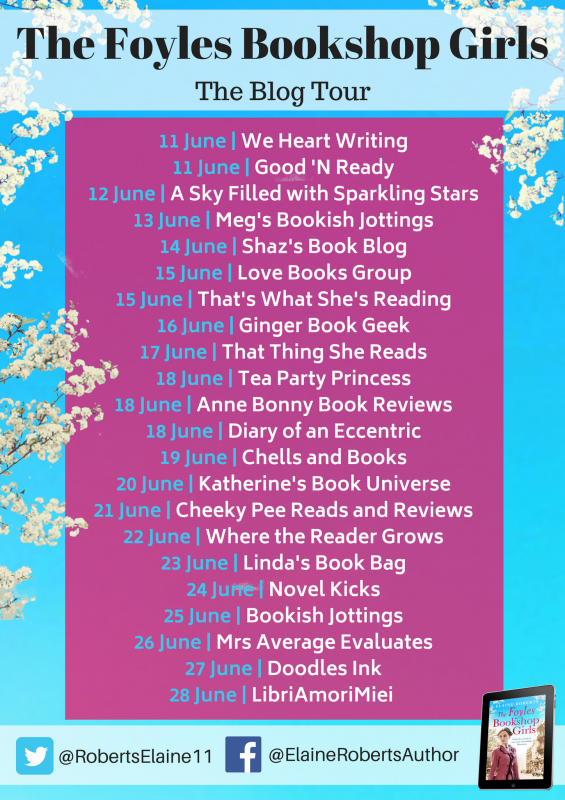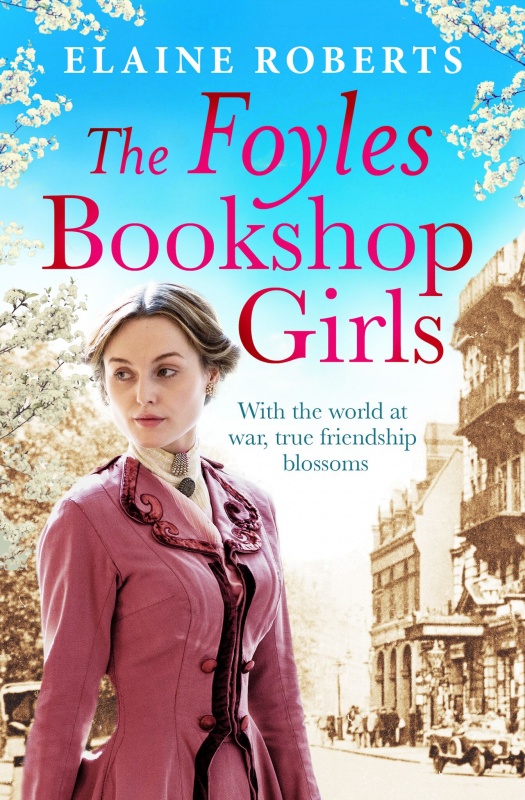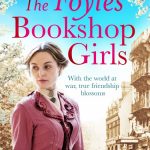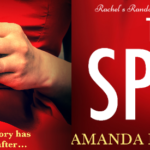NK Chats to… Elaine Roberts
 Welcome Elaine. Your new novel is called The Foyles Bookshop Girls. Can you tell me a bit about it?
Welcome Elaine. Your new novel is called The Foyles Bookshop Girls. Can you tell me a bit about it?
It begins in 1914 when the threat of war with Germany hangs over the country.
There’s a strong bond between Alice, Victoria, and Molly, which stems back to their childhood, and continues as they work together in Foyles Bookshop.
When Alice’s underage brother, Charles, joins up, her boyfriend, Freddie, consoles her. He declares his love and wants to marry at the earliest opportunity, but her excitement is ripped away when he admits to signing up and leaves the following day.
The girls pull together and their friendship helps them to survive the trials and tribulations that lay ahead of them.
What are the challenges with writing a historical novel? What was your planning process like?
One of the biggest challenges is the research. It is easy to get lost in the events. At one point I had so much information, I had to remind myself I wasn’t writing a World War One book. This is inextricably linked to not wanting to let the reader down.
After all my research is done, I construct a historical timeline of events. This will be the basis of my story. My characters lives, and things that happen to them, are woven around, or into, the historical setting.
In The Foyles Bookshop Girls, I had three timelines – the historical facts of the war, the history of Foyles and my characters’ lives. All the information is put on to a spreadsheet in chronological order. The skeleton of my story is there, so that leaves the task of adding the detail, and that’s when I become creative.
What was it that drew you to the historical setting and why Foyles?
My setting evolved. Alice’s mother was originally a young girl in a Victorian novel I had written, but I was advised by an industry professional that this period wasn’t popular unless you were an already established author, which I obviously wasn’t. Someone close to me suggested I move my characters forward in time, so I started looking at events in history.
I have a love of books, so I was playing with the idea of having my main male character working in, or owning, a bookshop.
What is your typical writing day like? Do you have any rituals or habits?
I have a system of working. I try to write every day, even if it’s only a few hundred words, and my best creative time is first thing in the morning. I’m often answering emails and on social media on my phone by about six in the morning. That’s the time I used to get up for work and I can’t seem to get out of the habit of waking up early.
I’m sitting at my desk by nine every morning, often accompanied by two cats that like to get into and sit on all of my paperwork. I don’t leave my office, apart from twenty minutes at lunchtime, until three in the afternoon, unless a visitor arrives. It sounds hard work doesn’t it, but in those six hours, I do spend time gazing down my garden, looking for inspiration, stroking and taking photos of the cats. I’m quite fortunate that my husband keeps me fed and watered.
Which song would best describe you and why?
It’s very hard to pick one song, because there are so many that I like, for very different reasons. Music is like many other creative art forms, particularly film and books and they all create an emotional response within me. There’s music that instantly transports me back to childhood, and creates memories of when my own children we’re young. I can remember playing air guitar to Bohemian Rhapsody with my ten-year-old son. I must admit, I do prefer a song I can sing and dance around the front room to. I have pored over many songs, to try and answer this question.
After much deliberation and sleepless nights, I’m going to say Happy by Pharrell Williams. The reason I picked this is because I can’t help singing along with it, and it always gets my foot tapping. The lyrics are also about not letting life get you down, and while I worry about things like everyone does, I think that sums me up.
 Do you feel that plot or characters are more important and what elements do you think make a good novel?
Do you feel that plot or characters are more important and what elements do you think make a good novel?
This is a difficult question for me because I think a book without much of a plot can be good if the characters are written well. After all, it’s often the characters that we fall in love with, or really don’t like for one reason or another. Also, it’s the characters that we always want to know more about, after a book is finished. Having said all of that, I like a lot going on in the books that I read, otherwise they don’t hold my attention. For me, they have an equal standing, because one without the other would be a disappointment to the reader. Can you tell I’m thinking out loud?
The first page of a book has to grab me; it has to hook me into the drama that’s to come. Then it has to be a page-turner, with pace and tension, as well as the softer bits, to allow me to catch my breath. I want to be able to relate to my characters, their feelings and situations.
Which authors have influenced you most? Is there one book or author that is your favourite?
I suspect the impressions we gain as children have the biggest effect. Without us realising it, they help form our views on life. On that basis, I would say it was the books I read as a child. I remember Enid Blyton and C. S. Lewis books held my imagination captive, making me want to read more and more. I do believe every book I’ve ever read has influenced me.
For some years now, my favourite author has been Dorothy Koomson, because she writes about a variety of subjects and she packs a lot into her novels. I always buy her books as soon as they are available, and they are sitting on my shelves. However, since I have been writing more, I have got behind with my reading, but I will catch up.
When I decided to change from writing modern to historical, I started reading sagas. I’ve read many but I’m not going to name them, because I know too many of the authors personally. Having said that, I thoroughly enjoy Dilly Court’s novels and it was when I read Christmas Cardthat I got excited and wanted to give writing a saga a go. That was when the idea of The Foyles Bookshop Girlsfirst came into being.
 Which point in history would you choose to go and visit?
Which point in history would you choose to go and visit?
The Victorian period has always held a fascination for me. Any films of that period, I’m there like a shot, and that’s probably why I chose that time to write about for my first historical saga. Having said that, when I started to delve into the social history of 1914-1918, that had me hooked as well. Women achieved so much in that period. There are many things that we take for granted today, that women had to fight for; the obvious one was the right to vote. They proved to the powers that be that there was more to them than being in domestic service. They were the backbone of the country, while the men were away fighting. My main character in the The Foyles Bookshop Girls, Alice, had to have the allegiance of her mother, to stand against her father for the right to work in Foyles Bookshop. Her mother and grandfather wouldn’t allow her to have an arranged marriage, because they believed in love.
There are so many things that we all take for granted today, that our ancestors fought or gave their lives for.
What is next for your characters?
I’m currently writing the second book of the series,The Foyles Girls at War. This will be Molly’s story, as she tries to change direction and do more for the war effort. Alice and Victoria will be concerned about her decision-making, but they won’t be seeing her every day, as she takes up a permanent position elsewhere. We meet Molly’s family and discover more about them. As always, the girls’ friendships will be tested, as indeed will Molly’s family life.
My third novel is planned and waiting to be written. It will be Victoria’s trials and tribulations. She has shouldered so much responsibility, that she is almost old before her time. While she loves her friends to bits, she can’t help but feel she is being left behind, as their lives move on, but hers feels stuck in the same place it was seven years ago.
I don’t want to say any more, in case I give too much away.
Do you have any more advice for new writers?
Don’t be alone. Writing is a solitary activity, but join a creative writing class or an organisation like, or similar to the Romantic Novelists Association, which has a new writers scheme. The Society of Women Writers and Journalists have also recently started their version of the scheme. These organisations offer critiques on your writing, which are worth their weight in gold.
Patience is an important element. I always think it’s about serving your apprenticeship. Everyone thinks because they can write, they can produce a novel, but they need to understand everything that is involved with it. I liken it to learning to play chopsticks on the piano at school, which doesn’t mean that, five minutes later, you could be a concert pianist. It takes patience and dedication.
Perseverance is key. I’ve many novels on my laptop that have been rejected because they weren’t what the publishers were looking for, but it doesn’t mean they were rubbish.
Above all else, don’t give up.
 About Elaine:
About Elaine:
Elaine Roberts had a dream to write for a living. She completed her first novel in her twenties and received her first very nice rejection. Life then got in the way until she picked up her dream again in 2010. She joined a creative writing class, The Write Place, in 2012 and shortly afterwards had her first short story published. Elaine and her patient husband, Dave, have five children who have flown the nest. Home is in Dartford, Kent and is always busy with their children, grandchildren, grand dogs and cats visiting.
Follow Elaine on Twitter: @RobertsElaine11 and Facebook: @ElaineRobertsAuthor
 About the book
About the book
London, 1914: one ordinary day, three girls arrive for work at London’s renowned Foyles bookshop. But when war with Germany is declared their lives will never be the same again…
Alice has always been the ‘sensible’ one in her family – especially in comparison with her suffrage-supporting sister! But decidedly against her father’s wishes, she accepts a job at Foyles Bookshop; and for bookworm Alice it’s a dream come true. But with the country at war, Alice’s happy world is shattered in an instant.
Determined to do what she can, Alice works in the bookshop by day, and risks her own life driving an ambulance around bomb-ravaged London by night. But however busy she keeps herself, she can’t help but think of the constant danger those she loves are facing on the frontline…
Alice, Victoria and Molly couldn’t be more different and yet they share a friendship that stems back to their childhood – a friendship that provides everyday solace from the tribulations and heartbreak of war.
Perfect for fans of Elaine Everest, Daisy Styles and Rosie Hendry.
To view on Amazon: https://www.amazon.co.uk/Foyles-Bookshop-Girls-
To view on Kobo: https://www.kobo.com
To view on iBooks: https://itunes.apple.com
To view on Google Play: https://play.google.com
Follow Aria via their Website: www.ariafiction.com, Twitter: @aria_fiction, Facebook: @ariafiction
and Instagram: @ariafiction




Leave a Reply